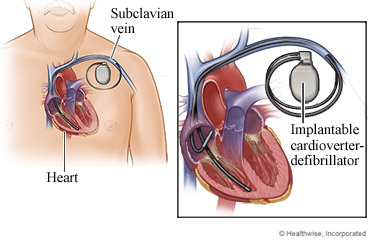
What is an implantable cardioverter-defibrillator?
An implantable cardioverter-defibrillator (ICD) is a small, battery-powered device. It fixes life-threatening changes in your heartbeat. If the ICD detects a life-threatening heart rhythm, it may try to get it back to normal using electrical pulses. If the dangerous rhythm does not stop, the ICD sends an electric shock to the heart to restore a normal rhythm. The device then goes back to its watchful mode.
The doctor puts an ICD in your chest and attaches it to one or two thin wires, called leads. The leads carry the shocks from the ICD to the heart.
Before the procedure, you will get medicine to help you relax. The doctor will make an incision (cut) in the skin just below your collarbone or at the side of your chest. The doctor will put the ICD leads through the cut. For one type of ICD, your doctor puts one or two leads (wires) in a large blood vessel and threads them into the heart. For another type, the lead may be placed under the skin through a small cut in the middle of your chest. Then your doctor connects the leads to the ICD. Your doctor puts the ICD under the skin of your chest and closes the cut. Your doctor also programs the ICD.
The procedure may take about 1 or 2 hours. You may stay in the hospital for at least one night.
You can likely return to many of your normal activities after you get an ICD. But to stay safe, you may need to make some changes to your normal routine. You will need to be careful with certain types of electronic equipment. And you'll need to take extra care with medical and dental tests and procedures. You will be given specific instructions after getting your ICD.
You may feel anxious or worried about having an ICD. This is common. You might feel better if you use techniques to help you relax. Make a plan for what to do if the ICD shocks you. And think about how the ICD will help you. Talk to your doctor about ways to help ease anxiety.
How do you prepare for the procedure?
Procedures can be stressful. This information will help you understand what you can expect. And it will help you safely prepare for your procedure.
 Preparing for the procedure
Preparing for the procedure
- Be sure you have someone to take you home. Anesthesia and pain medicine will make it unsafe for you to drive or get home on your own.
- Understand exactly what procedure is planned, along with the risks, benefits, and other options.
- If you take a medicine that prevents blood clots, your doctor may tell you to stop taking it before your procedure. Or your doctor may tell you to keep taking it. (These medicines include aspirin and other blood thinners.) Make sure that you understand exactly what your doctor wants you to do.
- Tell your doctor ALL the medicines, vitamins, supplements, and herbal remedies you take. Some may increase the risk of problems during your procedure. Your doctor will tell you if you should stop taking any of them before the procedure and how soon to do it.
- Make sure your doctor and the hospital have a copy of your advance directive. If you don't have one, you may want to prepare one. It lets others know your health care wishes. It's a good thing to have before any type of surgery or procedure.
What happens on the day of the procedure?
-
Follow the instructions exactly about when to stop eating and drinking. If you don't, your procedure may be canceled. If your doctor told you to take your medicines on the day of the procedure, take them with only a sip of water.
-
Take a bath or shower before you come in for your procedure. Do not apply lotions, perfumes, deodorants, or nail polish.
-
Take off all jewelry and piercings. And take out contact lenses, if you wear them.
At the hospital or surgery center
-
Bring a picture ID.
-
You will be kept comfortable and safe by your anesthesia provider. You may get medicine that relaxes you or puts you in a light sleep. The area being worked on will be numb.
-
The procedure will take at least 1 hour.
When should you call your doctor?
- You have questions or concerns.
- You don't understand how to prepare for your procedure.
- You become ill before the procedure (such as fever, flu, or a cold).
- You need to reschedule or have changed your mind about having the procedure.
Where can you learn more?
Go to http://www.healthwise.net/patientEd
Enter W470 in the search box to learn more about "ICD (Implantable Cardioverter-Defibrillator) Placement: Before Your Procedure".
Current as of: October 2, 2025
Author: Ignite Healthwise, LLC Staff
Clinical Review Board
All Ignite Healthwise, LLC education is reviewed by a team that includes physicians, nurses, advanced practitioners, registered dieticians, and other healthcare professionals.

